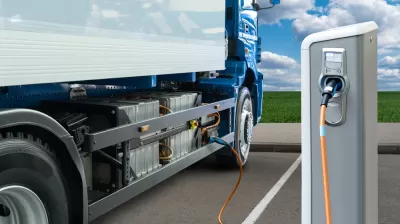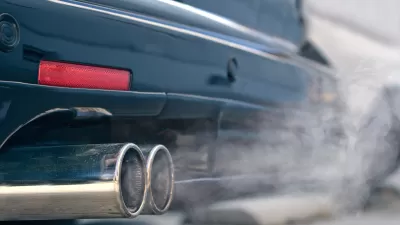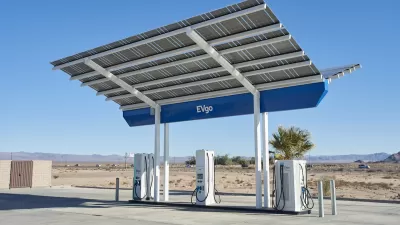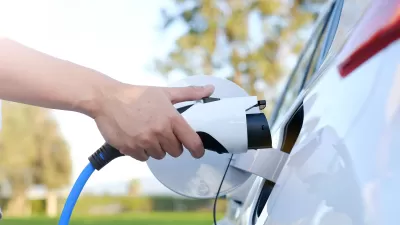The EPA unveiled two far-reaching rules to tighten emission standards for light, medium and heavy duty vehicles that can only be met by transitioning to zero-emission vehicles. The proposal is certain to be challenged in court as an agency overreach.

“By proposing the most ambitious pollution standards ever for cars and trucks, we are delivering on the Biden-Harris Administration’s promise to protect people and the planet, securing critical reductions in dangerous air and climate pollution and ensuring significant economic benefits like lower fuel and maintenance costs for families,” said Environmental Protection Agency (EPA) Administrator Michael S. Regan in his agency's press release on Wednesday, April 12.
- The first set of proposed standards announced today, the 'Multi-Pollutant Emissions Standards for Model Years 2027 and Later Light-Duty and Medium Duty Vehicles,' builds on EPA’s existing emissions standards for passenger cars and light trucks for MYs 2023 through 2026.
-
“The second set of proposed standards announced today, the 'Greenhouse Gas Standards for Heavy-Duty Vehicles - Phase 3'...would complement the criteria pollutant standards for MY 2027 and beyond heavy-duty vehicles that EPA finalized in December 2022 and represent the third phase of EPA’s Clean Trucks Plan.”
“The proposed tailpipe pollution limits for cars, first reported by The New York Times on Saturday [April 8], are designed to ensure that 67 percent of sales of new light-duty passenger vehicles, from sedans to pickup trucks, will be all-electric by 2032,” wrote Coral Davenport, climate reporter for The New York Times, on April 12 in the source article.
Additionally, 46 percent of sales of new medium-duty trucks, such as delivery vans, will be all-electric or use some other form of zero-emissions technology by the same year, according to the plan.
Legal scrutiny ahead
Davenport goes on to note that unlike the California Air Resources Board, arguably the second-most powerful environmental regulatory authority in the nation, the “E.P.A. cannot mandate that carmakers sell a certain number of electric vehicles.”
But under the Clean Air Act, the agency can limit the pollution generated by the total number of cars each manufacturer sells. And the agency has set that limit so tightly that the only way manufacturers can comply is to sell a certain percentage of zero-emissions vehicles. Each model year that the rule is in effect, car companies will report to the federal government the average greenhouse emissions of all new cars sold. Companies that fall short of the standard could be penalized in different ways, including fines of billions of dollars.
The proposed regulations will surely face legal challenges from those who see them as government overreach.
In fact, that overreach by federal regulatory agencies was the central reason behind the U.S. Supreme Court's landmark decision last June that nullified the Obama-Biden administration's Clean Power Plan.
A group of about a dozen Republican attorneys general has filed lawsuits against the Biden administration’s climate polices, and one of its leaders, Attorney General Patrick Morrisey of West Virginia, suggested the group would fight the newest proposals.
AG Morrisey's involvement may be an ominous sign. The aforementioned landmark decision: West Virginia vs. EPA.
Related in Planetizen:
- The Beginning of the End of the Internal Combustion Engine Vehicle? August 29, 2022
- Did the Supreme Court Gut Federal Power? July 3, 2022
- Supreme Court Guts the U.S. EPA’s Ability to Limit Carbon Emissions, June 30, 2022
- Emissions Benefits of the Biden Administration's New Tailpipe Emissions Rules, January 3, 2022
- Biden Diversifies Cabinet With EPA Administrator, Interior Secretary Picks, December 21, 2020
Hat tip to Larisa Mănescu.
FULL STORY: E.P.A. Lays Out Rules to Turbocharge Sales of Electric Cars and Trucks

Maui's Vacation Rental Debate Turns Ugly
Verbal attacks, misinformation campaigns and fistfights plague a high-stakes debate to convert thousands of vacation rentals into long-term housing.

Planetizen Federal Action Tracker
A weekly monitor of how Trump’s orders and actions are impacting planners and planning in America.

San Francisco Suspends Traffic Calming Amidst Record Deaths
Citing “a challenging fiscal landscape,” the city will cease the program on the heels of 42 traffic deaths, including 24 pedestrians.

Adaptive Reuse Will Create Housing in a Suburban Texas Strip Mall
A developer is reimagining a strip mall property as a mixed-use complex with housing and retail.

Study: Anti-Homelessness Laws Don’t Work
Research shows that punitive measures that criminalized unhoused people don’t help reduce homelessness.

In U.S., Urban Gondolas Face Uphill Battle
Cities in Latin America and Europe have embraced aerial transitways — AKA gondolas — as sustainable, convenient urban transport, especially in tricky geographies. American cities have yet to catch up.
Urban Design for Planners 1: Software Tools
This six-course series explores essential urban design concepts using open source software and equips planners with the tools they need to participate fully in the urban design process.
Planning for Universal Design
Learn the tools for implementing Universal Design in planning regulations.
Heyer Gruel & Associates PA
JM Goldson LLC
Custer County Colorado
City of Camden Redevelopment Agency
City of Astoria
Transportation Research & Education Center (TREC) at Portland State University
Jefferson Parish Government
Camden Redevelopment Agency
City of Claremont





























